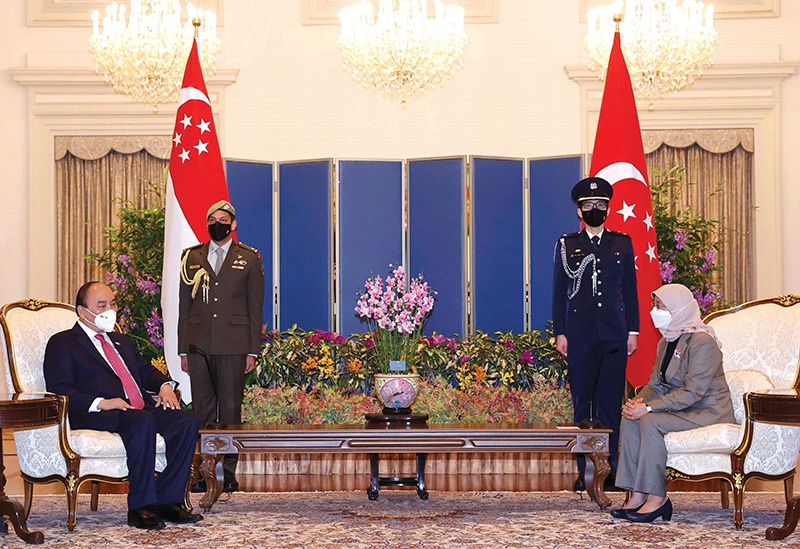Singaporeans add to moves in Vietnam
 |
| Vietnamese State President Nguyen Xuan Phuc (left) met with Singaporean counterpart Halimah Yacob, photo VNA |
Vietnamese-backed TH Group and HAO Mart, a leading retail supermarket system in Singapore, last week signed an MoU on strategic cooperation on consuming and promoting TH’s fresh milk products, foodstuffs, and organic agricultural products in the Singaporean market.
The signing ceremony was witnessed by Vietnamese State President Nguyen Xuan Phuc on the sidelines of his state visit to Singapore last week.
HAO Mart is managed by HAO Corp, which mainly operates in electronics and retails. Established in 2016, HAO Mart has so far expanded its retail chain to a large network of nearly 50 stores in Singapore. It distributes more than 70,000 types of fast-moving consumer goods imported from 43 markets, and annual revenues have hit more than $90 million.
TH Group sees Singapore as a market of strong potential in Southeast Asia, and in past years has conducted a series of trade promotion activities in the city-state.
Last year, TH Group cooperated with distributor L’earth Group to expand its markets to both Singapore and Malaysia. In December, TH Group and L’earth launched a Singapore-Vietnam foodstuff exchange which will be valid until the end of this year and is applicable to many e-commerce platforms, retail stores, and supermarkets in both countries.
At last week’s Vietnam-Singapore Business Dialogue, President Phuc said TH Group and many other enterprises of both nations are contributing to increasing the trade and investment ties between the two economies. “Vietnam welcomes all of you to come for investment and business,” he stressed. “Your successes are also those of our country.”
At the event, ministries and enterprises from both sides signed and exchanged some cooperation deals in the sectors of economics, commerce, security and defence, ICT, and sci-tech.
Meanwhile, it is expected that Vietnam’s Bamboo Airways will launch a Vietnam-Singapore route from March 24 as part of the carrier’s plan to expand its international network to 40 this year.
“Singapore’s aviation holds special importance for Vietnam, with the number of passengers visiting Vietnam ranking sixth under 2019 data,” said Vietnam’s Ministry of Foreign Affairs last week. “Airlines in both Vietnam and Singapore have resumed regular commercial flights between the two countries, with an agreed frequency of 14 flights per week for each nation.”
This is expected to help Vietnam and Singapore to increase their bilateral investment and trade cooperation within the strategic partnership, which was initially forged in 2013.
According to Vietnam’s Ministry of Planning and Investment, as of January 20, Vietnam wooed $92.37 billion in registered investment capital from ASEAN member states, with Singapore taking the lead ($65.23 billion), followed by Thailand ($13 billion), Malaysia ($12.85 billion), and the Philippines ($615 million). Singapore is also Vietnam’s second-biggest foreign investor so far, after South Korea at $77.32 billion.
The average investment capital for each Singaporean project is over $23 million, higher than the average of $11.9 million per foreign project in Vietnam.
Singapore was Vietnam’s biggest foreign investor last year, with total registered capital of more than $10.7 billion and accounting for 34.4 per cent of Vietnam’s total registered foreign direct investment of $31.15 billion.
“There are good reasons to be optimistic about the two countries’ future bilateral economic ties,” Singaporean Ambassador to Vietnam Jaya Ratnam recently told VIR. “For example, school closures have pushed education providers to adopt e-learning solutions. This has created an emerging market for edtech solutions.”
Ratnam added that there are also increasing opportunities for collaboration in e-commerce and e-payments. Many enterprises and consumers have pivoted to online shopping and contactless transactions – in turn, this has opened up the digital domain for companies of all sizes to provide better and more seamless online services, both within countries and across borders. Moreover, there are also openings for Singapore and Vietnamese businesses to capitalise on supporting industries for e-commerce, for example in logistics solutions.
“In addition, Vietnam and Singapore are also driving digitalisation in smart cities, Industry 4.0, e-government, cybersecurity, AI, and cloud technologies. As the economic landscape shifts, there remains much potential for Singapore and Vietnam to further expand and deepen their trade and investment ties,” Ambassador Ratnam said.
What the stars mean:
★ Poor ★ ★ Promising ★★★ Good ★★★★ Very good ★★★★★ Exceptional
Related Contents
Latest News
More News
- NAB Innovation Centre underscores Vietnam’s appeal for tech investment (January 30, 2026 | 11:16)
- Vietnam moves towards market-based fuel management with E10 rollout (January 30, 2026 | 11:10)
- Vietnam startup funding enters a period of capital reset (January 30, 2026 | 11:06)
- Vietnam strengthens public debt management with World Bank and IMF (January 30, 2026 | 11:00)
- PM inspects APEC 2027 project progress in An Giang province (January 29, 2026 | 09:00)
- Vietnam among the world’s top 15 trading nations (January 28, 2026 | 17:12)
- Vietnam accelerates preparations for arbitration centre linked to new financial hub (January 28, 2026 | 17:09)
- Vietnam's IPO market on recovery trajectory (January 28, 2026 | 17:04)
- Digital economy takes centre stage in Vietnam’s new growth model (January 28, 2026 | 11:43)
- EU Council president to visit Vietnam amid partnership upgrade (January 28, 2026 | 11:00)

 Tag:
Tag:




















 Mobile Version
Mobile Version